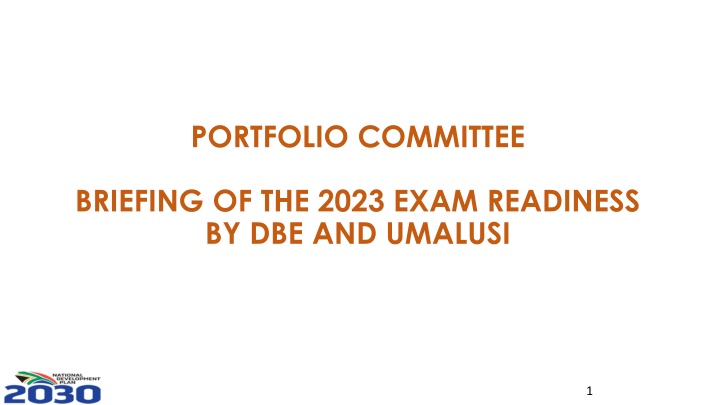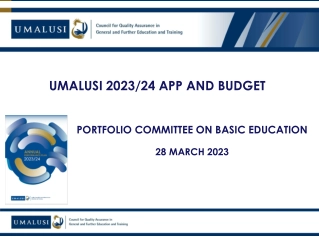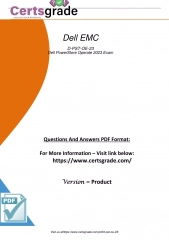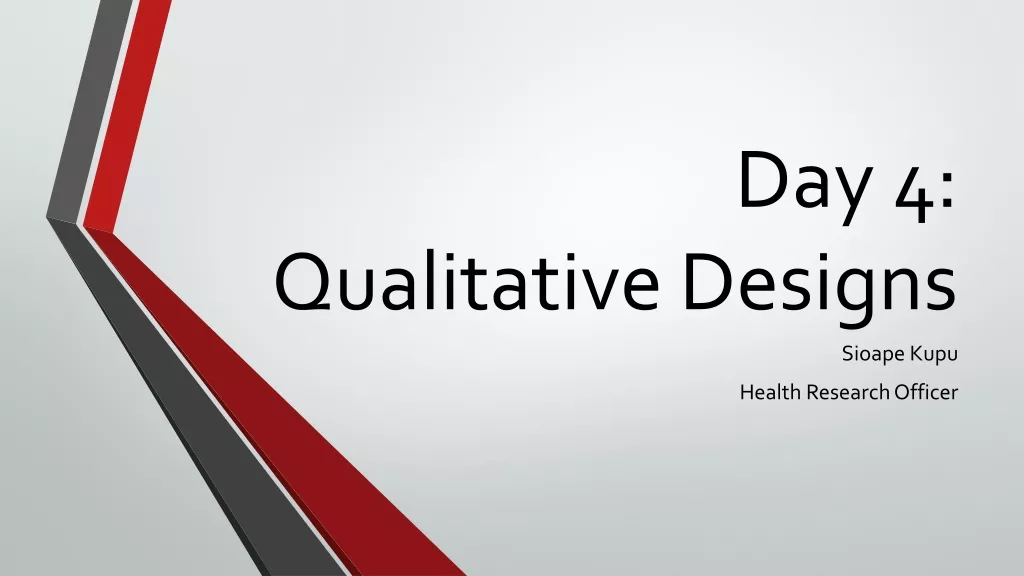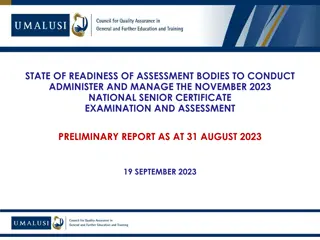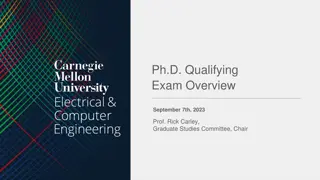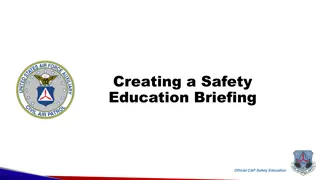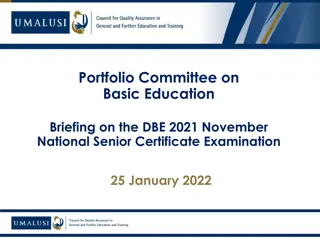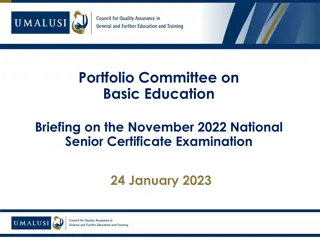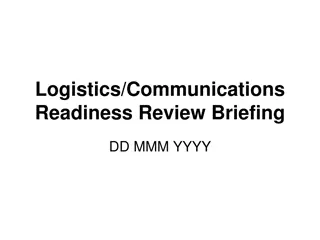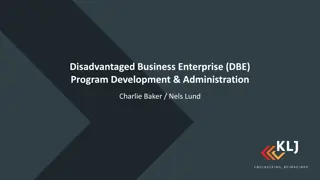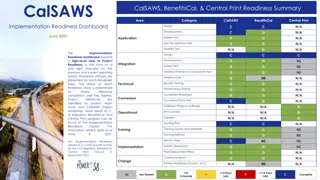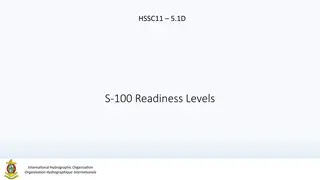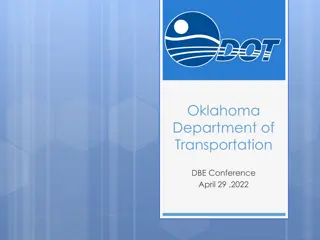Exam Readiness Briefing 2023 by DBE and Umalusi
The briefing covers the evolution and management of the national examinations system, examination cycle details, size and scope of the 2023 national examinations, and enrollment statistics from 2018 to 2023. It also outlines preparations, examination administration model, and recommendations for effective exam administration. The content emphasizes the importance of maintaining good practices, setting standards, coordination, and modernization in exam processes.
Download Presentation

Please find below an Image/Link to download the presentation.
The content on the website is provided AS IS for your information and personal use only. It may not be sold, licensed, or shared on other websites without obtaining consent from the author.If you encounter any issues during the download, it is possible that the publisher has removed the file from their server.
You are allowed to download the files provided on this website for personal or commercial use, subject to the condition that they are used lawfully. All files are the property of their respective owners.
The content on the website is provided AS IS for your information and personal use only. It may not be sold, licensed, or shared on other websites without obtaining consent from the author.
E N D
Presentation Transcript
PORTFOLIO COMMITTEE BRIEFING OF THE 2023 EXAM READINESS BY DBE AND UMALUSI 1
PRESENTATION OUTLINE Introduction Model for effective Examination The Examination Cyle Size and Scope of the 2023 National Examinations Preparations for the conduct of the 2023 Examinations Status of the Examination System Writing of the Examinations Marking Mark Capturing Monitoring of the Examination Cycle Management of Irregularities Generic Risks and Mitigation Strategies Consolidated System Evaluation Release of Results Recommendations
INTRODUCTION a) The National examinations and assessment system has evolved over the years to a significant level of maturity. b) The DBE currently manages two equal examination opportunities - one in May/June and the second in October/November. c) At any time in the year, the DBE and PEDs are managing three examinations: The past examination (the examination cycle ends with certification) The current examination (finalisation of preparation for the examination that is scheduled in the next few months) The next examination cycle (examination cycle begins 18 months prior to the examination. 3
THE MODEL FOR EFFECTIVE EXAM ADMINISTRATION Maintaining Good Practices Mediation of the Standard Monitoring and Evaluation Setting the Standard Support and Coordination Feedback Enhancement and Modernisation 4
THE EXAMINATION CYCLE Setting of question papers Certification Registration of candidates and centres The Release of the Results and feedback to the system Printing, Storage and Distribution of question papers Packaging, The Capture, Processing and Standardisation of the Results Preparation for the writing of the examination The writing of the examination The Marking of the examination 5
SIZE AND SCOPE OF THE 2023 NATIONAL EXAMINATIONS 6
NATIONAL FULL- TIME ENROLMENT 2018 TO 2023 Year 2018 Total Entered 624 733 2019 616 754 2020 607 226 2021 733 198 753 964 2022 723 971 2023 Source: NSC Exams DBE 7
GRAPHICAL REPRESENTATION: ENROLMENT 2019 TO 2023 (NATIONAL) 752,003 733,198 723,971 800,000 700,000 616,754 607,226 600,000 500,000 400,000 300,000 200,000 100,000 0 2019 2020 2021 2022 2023 8 Source: NSC Exams DBE
NSC PART TIME ENROLMENTS 2019 TO 2023 170,963 168,631 180,000 163,965 160,000 129,064 140,000 117,808 120,000 100,000 80,000 60,000 40,000 20,000 0 2019 2020 2021 2022 2023 9
PROVINCIAL FT ENROLMENT: 2019 - 2023 Province 2019 2020 2021 2022 2023 79 297 77 620 95 841 98 756 101 293 EASTERN CAPE 30 041 29 289 36 405 37 969 35 642 FREE STATE 111 188 115 069 132 856 138 871 133 390 GAUTENG 147 554 144 307 177 331 174 413 170 637 KWAZULU-NATAL 93 932 79 813 106 581 111 543 94 441 LIMPOPO 56 833 56 030 69 222 71 580 68 848 MPUMALANGA 33 057 38 292 42 152 44 605 42 258 NORTH WEST 11 459 12 021 12 987 13 866 13 297 NORTHERN CAPE 53 393 54 785 59 823 62 361 64 165 WESTERN CAPE 753 964 616 754 607 226 733 198 723 971 NATIONAL 10
PROVINCIAL ENROLMENT 2019 TO 2022 200,000 180,000 160,000 140,000 120,000 100,000 80,000 60,000 40,000 20,000 0 EC FS GP KZ LP MP 56,833 56,030 69,222 71,369 68,848 NW 33,057 38,292 42,152 44,619 42,258 NC WC 53,393 54,785 59,823 62,350 64,165 2019 2020 2021 2022 2023 79,297 77,620 95,841 97,831 101,293 30,041 29,289 36,405 37,970 35,642 111,188 115,069 132,856 138,871 133,390 147,554 144,307 177,331 173,544 170,637 93,932 79,813 106,581 111,618 94,441 11,459 12,021 12,987 13,831 13,297 Source: NSC Exams DBE 11
PART-TIME ENROLMENT 2022 - 2023 Province 2022 2023 Difference Eastern Cape 18 665 14 414 -4 251 Free State 7 845 7 594 -251 Gauteng 55 849 54 840 -1 009 KwaZulu-Natal 23 598 23 338 -260 Limpopo 34 150 8 981 -25 169 Mpumalanga 10 552 4 832 -5 720 North West 4 250 3 188 -1 062 Northern Cape 2 263 1 689 -574 Western Cape 11 459 10 188 -1 271 National 168 631 129 064 -39 567 12
NSC PROGRESSED CANDIDATES 2022/2023 Province 2022 2023 Difference Eastern Cape 5 459 7 398 1 939 Free State 3 638 3 591 -47 Gauteng 9 124 7 976 -1 148 KwaZulu-Natal 13 736 13 685 -51 Limpopo 9 687 10 230 543 Mpumalanga 4 181 5 827 1 646 North West 3 801 3 426 -375 Northern Cape 1 012 1 080 68 Western Cape 2 323 1817 -506 National 52 961 53 217 256 13
SUBJECT ENROLMENT: 2022 - 2023 SUBJECT 2022 107 239 2023 104 290 DIFF -2 949 Accounting Agricultural Sciences 128 180 120 138 -8 042 Business Studies 247 784 235 692 -12 092 Economics 141 208 128 465 -12 743 Geography 377 075 355 432 -21 643 History 242 655 234 042 -8 613 Life Sciences 407 919 391 412 -16 507 Mathematical Literacy 460 708 436 945 -23 763 Mathematics 276 241 271 297 -4 944 Physical Sciences 213 554 213 412 -142 14
SUBJECT ENROLMENT: 2022 - 2023 500,000 450,000 400,000 350,000 300,000 250,000 200,000 150,000 100,000 50,000 0 Accounting Agricultural Sciences 128,180 Business Studies 247,784 Economics Geography History Life Sciences Mathematical Literacy 460,708 Mathematics Physical Sciences 213,554 2022 107,239 141,208 377,075 242,655 407,919 276,241 2023 104,290 120,138 235,692 128,465 355,432 234,042 391,412 436,945 271,297 213,412
TECHNICAL SUBJECT ENROLMENT: 2022 2023 SUBJECT 2022 754 2023 789 DIFF 35 Civil Technology (Civil Services) 4 869 4 518 Civil Technology (Construction) -351 2 582 2 287 Civil Technology (Woodworking) -295 395 396 Electrical Technology (Digital Systems) 1 1 215 1 146 Electrical Technology (Electronics) -69 6 006 6 070 Electrical Technology (Power Systems) 64 39 510 38 966 Engineering Graphics and Design -544 3 693 3 811 Mechanical Technology (Automotive) 118 1 982 2 063 Mechanical Technology (Fitting and Machinery) 81 2 445 2 481 Mechanical Technology (Welding and Metalwork) 36 15 031 15 681 Technical Mathematics 650 16 113 16 768 Technical Sciences 655 16
ENROLMENT - CLASS OF 2023 GRADE 10,11 & 12 Percentage Promoted Throughput Rate from grade 10 to Grade 12 Grade 10 Enrolment Grade 11 Enrolment Grade 12 Enrolment from Grade 10 to Grade 11 (2021) (2022) Province EASTERN CAPE 135 346 116 493 86.1% 101 293 74.8% FREE STATE 60 638 44 377 73.2% 35 642 58.8% GAUTENG 165 263 130 903 79.2% 133 390 80.7% KWAZULU-NATAL 205 780 197 114 95.8% 170 637 82.9% LIMPOPO 144 542 122 162 84.5% 94 441 65.3% MPUMALANGA 89 975 80 602 89.6% 68 848 76.5% NORTH WEST 62 765 51 251 81.7% 42 258 67.3% NORTHERN CAPE 20 601 14 907 72.4% 13 297 64.5% WESTERN CAPE 89 538 75 494 84.3% 64 165 71.7% NATIONAL 974 448 833 303 85.5% 723 971 74.3%
ENROLMENT - CLASS OF 2023 GRADE 10,11 & 12 COHORT ENROLMENT - CLASS OF 2023 - GRADE 10, 11 & 12 250,000 200,000 150,000 100,000 50,000 0 18 Grade 10 Enrolment (2021) Grade 11 Enrolment (2022) Grade 12 Enrolment
PREPARATION FOR THE CONDUCT OF THE 2023 EXAMINATION 19
NON-NEGOTIABLES FOR 2023 a) Full security compliance at printing site b) 100% compliance on all storage points. c) Highest quality level of invigilator training. d) 70% monitoring coverage. e) Strict adherence to the marker ratio (1:5). f) Fully fledged marker management system. g) Accurate release of every candidate s results. h) Conduct of the District exam system review by Head Office. i) Conduct of the District state of readiness by Head Office j) Improved Interaction with all units involved in Exams e.g. EMIS, Inclusive Education, Curriculum, Security Management, etc. k) Improvement in reporting and managing irregularities 21
STATUS OF THE EXAMINATION SYSTEM 22
QUESTION PAPERS a) A total of 162 question papers have been set by expert subject panels appointed and managed by DBE. b) All question papers have been edited, translated and quality assured to ensure error free papers c) All question papers have been moderated and approved by Umalusi for the November 2023 Examinations and are ready for hand over to PEDs for printing. d) Question papers were adapted for braille, audio, deaf and large print for candidates who encounter barriers to learning. 23
PRINTING, PACKING, STORAGE AND DISTRIBUTION (PPSD) a) The DBE has conducted an audit of all sites where question papers are printed, packed and stored. b) All PEDs were found to be fully prepared to print, pack, store and distribute question papers. c) The DBE is working closely with the State Security Agency to audit the sites where printing is taking place. Seven of the nine Printing Sites have been audited except for North West and Free State which is scheduled for late September. d) The DBE has clear criteria that must be satisfied at centres where question papers are stored. e) The DBE and PEDs audited each of these storage points to ensure compliance with the criteria. f) In the case of the WCED, because question papers are stored at each of the schools, the schools had to satisfy the criteria relating to a storage point. The province uses a smart locking mechanism as an added security mechanism to ensure security at schools. 24
SOUTH AFRICAN SIGN LANGUAGE (SASL) a) This is the sixth cohort that will sit for SASL HL examinations in November 2023. b) A total of 23 schools in 9 provinces have candidates for the 2023 examination c) A total of 134 candidates have been registered for SASL HL. d) Question papers are signed and video recorded and made available to candidates on the morning of the examination. e) All schools were audited by the PEDs to ensure readiness to administer the exams. f) Guidelines for the administration of the SASL HL examination has been sent to all schools offering SASL HL. g) The signed responses of candidates ( scripts in audio-visual format) will be marked centrally for standardisation purposes. 25
NUMBER OF EXAMINATION CENTRES Province Public Schools Independent Centres Eastern Cape Free State Gauteng Kwazulu-Natal Limpopo Mpumalanga North West Northern Cape Western Cape National 899 325 676 1 700 1 251 533 426 139 388 6 337 48 22 244 63 47 35 20 7 66 552
TRAINING OF INVIGILATORS a) Training of invigilators will commence in September 2023 in all PEDs and will conclude during the first week of October 2023. b) All PEDs have adopted a Core Team Training approach to the training of Chief Invigilators and invigilators. c) The DBE has directed that a core team comprising Provincial Head Office and District Officials be used to train both Chief Invigilators and Invigilators. d) This implies that all invigilators at school level are trained by the Core Team thus ensuring that the content of the training is uniform across all exam centres. e) The PEDs have updated their invigilator training manuals/presentations to include case studies based on incidents that occurred during writing in previous examination sittings. 28
CONCESSIONS & ACCOMMODATIONS a) Learners with Special Education accommodated through the provision of question papers that are adapted, brailed, large print and audio-versioning. b) Various forms of accommodations have also been granted to LSEN to address the various barriers to learning. These include extra time, use of scribes/readers, rest breaks, prompters, etc. c) Concessions are also offered where deviations from policy is granted to address special barriers to learning e.g. dyscalculia. d) The DBE has now included special tariffs for scribes and readers in the revised PAM document. This is expected to improve the availability of scribes and readers remuneration for their services. e) PEDs are also expected to establish a central pool of trained scribes and readers who will be deployed to schools as required. Needs (LSEN) will be and to standardise the 29
WRITING a) The examination will be written in the main at schools (public and independent), Adult Education and Training (AET) centres as well special centres established by the province (designated centres). b) All the examination centres have been audited by the PEDs to confirm their readiness to administer the examination. c) The DBE will also conduct audits of a sample of high-risk centres: public, independent and AET centres during September 2023. d) The DBE will monitor closely the writing of the October/November 2023 NSC Examinations. e) All examination centres have been classified in accordance with their risk profile and the monitoring will be commensurate to the risk profile: a) High risk centres: take over of the centre or resident monitor b) Medium risk centres: resident monitor or roving monitor c) Low risk centres: roving monitor 30
MARKING 31
MARKER SELECTION AND APPOINTMENT a) All PEDs are in the process of completing the marker selection processes and markers are being selected in line with the PAM criteria, which includes: A 3-year post school qualification; At least a two-year post school qualification in the subject to be marked; At least two years experience in the last 5 years in the subject to be marked b) The marker applications were verified at school and district level before submission to PEDs to ensure that only eligible markers are considered. c) An additional number of novice and reserve markers have been selected. d) DBE will conduct an audit of the selected markers to ensure that the PAM criteria is appropriately applied 32
NUMBER OF MARKERS PER PROVINCE - 2023 Provincial Education Department Estimated Appointed Markers for 2023 Eastern Cape 5715 Free State 2914 Gauteng 12615 Kwa-Zulu Natal 10457 Limpopo 7354 Mpumalanga 5401 Northern- Cape 1115 North-West 3410 Western Cape 4945 53 926 Total 33
MARKING CENTRES a) All PEDs have identified the number of marking centres required. b) Marking centres have been evaluated for suitability and capacity to host the marking. c) The DBE is responsible for the hosting of centralised marking of subjects with small enrolments. d) In all PEDs, except Gauteng, residential marking is hosted. e) Markers in Gauteng are able to travel on a daily basis given the short distances between the location of the marking centres and the homes of markers. 34
MARKING CENTRES 2023 Provincial Education Department Number of Marking Centres Eastern Cape 26 Free State 19 Gauteng 30 Kwa-Zulu Natal 32 Limpopo 27 Mpumalanga 19 Northern- Cape 3 North-West 21 Western Cape 12 DBE Total 1 190 35
STANDARDISATION OF MARKING GUIDELINES a) The purpose of marking standardisation meetings (MSMs) in to ensure that marking guidelines are discussed and finalised to include all alternative responses. b) The setting panel, the Umalusi moderator, the Internal Moderators (IMs) and Chief markers (CMs) from each of the PEDs are part of these meetings. c) A total of 147 marking standardisation meetings will be convened. d) All MSMs will be chaired by Independent Chairpersons, nominated by PED`s, and they will lead discussions during the Marking Standardisation Meetings. e) All PED CMs and IMs will be subjected to an intensive DBE training and authorisation process following the standardisation of the marking guidelines f) Only authorised CMs and IMs will be allowed to lead the marking process in the provinces. g) The training and authorisation process conducted at the DBE will then be replicated by the CMs and IMs in the provinces 36
QUALITY ASSURANCE OF MARKING a) Quality assurance of marking will be conducted by DBE (Onsite Moderators) deployed to all provinces. b) The training and authorisation process replicated by the PED will be monitored by DBE Onsite Moderators c) The quality assurance measures adopted at the marking centres include: Moderation by senior markers/deputy moderator. 5 markers supervised by a senior marker Application of the Tolerance Range a) PED marking managers and Heads of Exams will monitor the implementation of the quality assurance measures. b) Monitoring of the marking session will also be conducted by the Director General. c) Marking Centre Managers are required to ensure regular engagement and monitoring of IMs and CMs throughout the marking session. chief marker/chief marker and internal 37
MARK CAPTURE a) All PEDs have clear plans for the capture of marks. b) Data capturers have been appointed. c) Most PEDs have identified mark capturing venues outside the marking venues. d) Double capture method is used to ensure the correctness of the marks captured. e) Quality control of mark sheets is intended to improve capturing of marks. f) Mark capture must be completed within a stipulated period. 39
MONITORING THE EXAMINATION SYSTEM a) Clear norms and standards are set for each of the exam processes and these are mediated in special meetings of provincial managers convened by the DBE. b) Monitoring is ongoing and comprises of the following: Regular meetings of Heads of Exams and DBE. Reports presented to the National Examinations and Assessment Committee (NEAC) Review of the Examination system Regular interactions between DBE and PED officials State of Readiness visits c) The entire examination cycle is monitored by the PEDs and the DBE. d) A detailed management plan covering all activities of the examination cycle is developed and serves as the basis for monitoring. e) The DBE conducts a review of the examination system in all PEDs and this was conducted across all provinces during June 2023 and July 2023. f) Following the review visits, Provincial Improvement Plans are developed and monitored by the DBE. g) The DBE will conduct a final state of readiness visit to all PEDs from September to October 2023 41
MONITORING OF THE EXAMINATION SYSTEM h) To ensure compliance across all PEDs, preliminary audits have been conducted during the review visits and follow up audits are being conducted: - Registration data - Printing, Packing, Storage and Distribution facilities - High risk examination centres - Marker appointments 42
AUDIT OF STORAGE POINTS a) All PEDs have audited their storage points. b) Storage points are audited against a list of agreed criteria. Non- compliance with these criteria will result in non-approval of the storage point. c) DBE is finalizing the verification of a sample of storage points. d) PEDs will not be allowed to use any of the storage points that have not been approved for storage of question papers. e) PEDs will be monitored closely for strict adherence to norm times during the distribution of question papers and collection of scripts. 43
MONITORING OF THE WRITING AND MARKING a) The PEDs and the DBE will monitor both the writing and the marking of the November 2023 NSC Examination. b) A total of 62 DBE part-time monitors and 20 SISCO officials will be deployed across the provinces to monitor the writing of the November 2023 NSC Examination. c) PEDs will submit their final monitoring plans to the DBE for evaluation. d) The monitoring plans are expected to be aligned to the risk profiles of centres. e) PEDs will target a monitoring coverage of at least 70%. f) The monitoring will be optimized by the use of an integrated approach and the adoption of the monitoring of the monitor approach. g) Daily monitoring reports are submitted from the examination centre to the provincial head office to the DBE 44
MANAGEMENT OF IRREGULARITIES a) There is improvement in most provinces on the management of irregularities. b) The process of detection, investigation and hosting of hearings has improved. c) Most provinces use dedicated officials to manage irregularities detected during marking. d) Plans are in place to resolve all administrative errors and omissions (AEOs) and behavioral offences and acts of dishonesty (BOADS) prior to release of results in Jan 2024. 46
CURBING OF EXAMINATION IRREGULARITIES a) Greater advocacy to encourage honesty by learners, teachers and principals. b) The DBE Chief Communicator has initiated an advocacy programme, focusing on examination readiness and has highlighted the issue of examination irregularities. c) Parents and learners sign the Commitment Agreement where they bind themselves to follow specific rules relating to the examination: - To make any irregularity related information immediately available to the school principal or the hotline - Surrender cell phone if there is an allegation of involvement. - Acceptance of assistance in the exam room, will imply complicity d) Examination hotline available 24/7 e) All candidates will sign the pledge at a school ceremony to confirm their non- participation in acts of dishonesty during the writing of the examination. 47
GENERIC RISKS AND MITIGATION STRATEGIES 48
GENERIC RISKS RISK MITIGATION STRATEGY Question Paper Leakage Intensive audit of all printing sites by SSA and DBE Tightening up of all security loopholes identified Very close monitoring PEDs to intensify the advocacy on consequences of committing irregularities. Invigilation and monitoring will be improved. Ensuring only approved independent centres are allowed to conduct examinations PEDs to manage exams where independent centres do not meet the criteria for approval as exam centres Establishment of designated centres to accommodate part- time candidates Implementation of multiple preliminary schedules to ensure all corrections are effected and checked. Group Copying Management of independent schools. Registration of candidates 49
GENERIC RISKS RISK MITIGATION STRATEGY Decentralization of certification services to districts. Capacity building sessions conducted by DBE. Commitment agreement for learners and teachers Exam 24hr hotline Pledge signing Intensive review of district examinations systems by DBE/PEDs State of readiness of all districts conducted by PEDs Certification issues Management of irregularities. District Coordination and management 50
